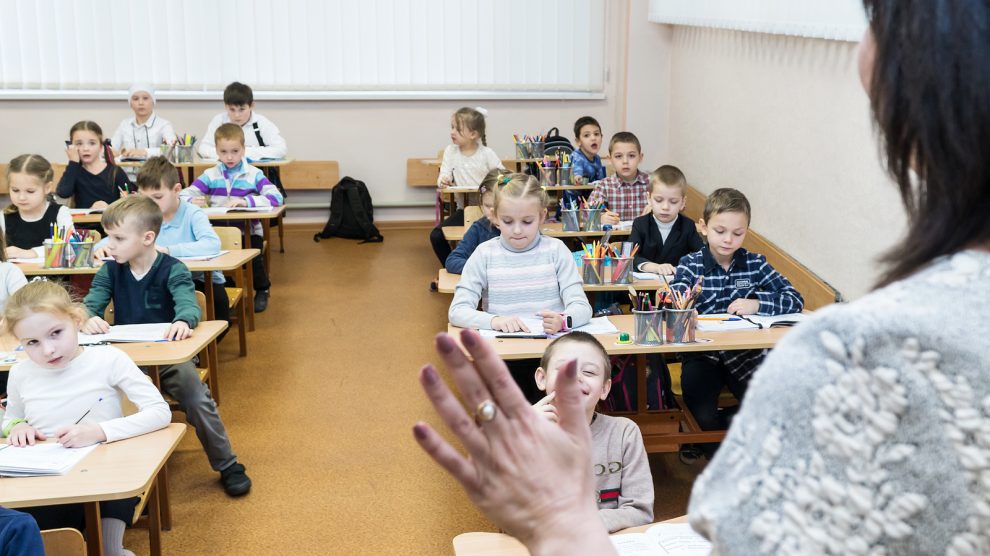By prioritising education, Ukraine can build a strong foundation for a resilient society capable of facing future challenges.
The implementation of reforms to ensure that Ukraine’s education system equips students with the practical skills essential for real-world applications will be crucial to the country’s recovery and reconstruction, a major new report from the Emerging Europe Institute recommends.
Ukraine’s War for Talent, produced with support from the German Marshall Fund of the United States, also recommends granting universities and higher education institutions more autonomy, the improvement of facilities, and greater use of digital tools throughout the education system.
Teachers should be provided with the right levels of training and support to effectively use modern technologies, equipping them with the skills to engage students in digital learning environments, while focus should also be placed on the reintegration of veterans and injured military personnel.
- The enormous potential of Ukraine’s economy
- Support for Ukraine is vital for European democracy
- Taking Ukraine’s female-owned businesses to the next level
“By prioritising education now, Ukraine can build a strong foundation for a resilient society capable of facing future challenges,” says Andrew Wrobel, founding partner at Emerging Europe and chairman of the supervisory council of the Emerging Europe Institute.
“It’s an investment that will pay dividends for generations, ensuring a brighter, more successful future for all Ukrainians.”
Education as a driver of development and growth
The report offers a comprehensive understanding of the current state of Ukraine’s education system and its potential role in supporting the country’s recovery and postwar social and economic success.
As the country navigates the challenges of ongoing conflict and strives for reconstruction, a robust education system is essential for fostering a resilient and knowledgeable population capable of driving sustainable development and economic growth.
By examining various aspects of the education sector, the report identifies challenges, positive aspects, and opportunities for enhancement to better align with the nation’s recovery goals.
“Our report offers multiple observations and insights from experts and provides policy recommendations which, if implemented, could contribute to Ukraine’s post-war social and economic success,” adds Wrobel.
These recommendations include updating curricula and incorporating project-based learning to equip students with practical skills, and raising entry standards to improve the quality of higher education quality.
Additionally, the report emphasises ongoing professional development for educators, investing in digital infrastructure and literacy, improving vocational training, modernising policies to ensure equity, and implementing initiatives to attract talent back to Ukraine.
Opportunities also need to be provided for professionals and students living abroad to return to Ukraine through targeted initiatives and quality education.
Incentives such as job placement assistance and financial support to attract skilled individuals back to the country could help here, the report finds.
Opportunities for investment
The report also recognises that the Ukrainian government is already actively working on implementing various solutions in collaboration with national and international partners.
The dynamic situation however, shaped by the ongoing conflict and emerging initiatives, requires more, ongoing adaptive and responsive strategies—and offers several opportunities for foreign and local investors.
These include EdTech innovations to facilitate personalised learning, verification and security solutions to prevent fraud and enhance trust in educational qualifications, language learning services, vocational training and upskilling, and the development and reconstruction of educational infrastructure.
In February, Ukraine’s Deputy Education Minister Yevhen Kudriavets said that over 3,500 educational institutions have suffered some kind of destruction, and nearly 400 have been completely destroyed. The World Bank puts the cost of restoring Ukraine’s educational infrastructure at nearly 14 billion US dollars.
“The initial reconstruction process is already taking place,” says Wrobel. “Not only can it alleviate human suffering by restoring basic infrastructure, housing, and healthcare facilities, but it also sends a strong message of resilience and hope to the Ukrainian people, showing that there is a future beyond the conflict.
“Investing in reconstruction can stabilise the country, jumpstart economic recovery, and create jobs.”
Flexibility and resilience
The conflict in Ukraine has profoundly affected its education system. Despite hardships, investing in education is crucial for the country’s postwar recovery, as it fosters human capital, promotes societal stability, and cultivates resilience.
Lessons from other conflict-affected nations highlight the need for tailored strategies and systemic improvements, such as prioritising the flexibility and resilience of the educational system to ensure learning continues despite disruptions.
The usage of digital tools and the hybrid learning models which were developed during the Covid-19 pandemic and full-scale invasion that combine in-person and digital education should be analysed from the perspective of efficiency and those with proven results utilised further.
By focusing on practical training, updated curricula, and governance, alongside tackling issues like low teacher salaries and inequality, Ukraine can chart a path towards a better future and sustainable development.
“Investing in education is crucial for Ukraine’s post-war recovery and future prosperity. Education equips people with skills and knowledge, which are essential for rebuilding the country’s infrastructure and economy,” concludes Wrobel.
“When citizens are well-educated, they can innovate, solve complex problems, and create new businesses that drive economic growth.”
A copy of the full report, Ukraine’s War for Talent, can be downloaded for free, here.
Unlike many news and information platforms, Emerging Europe is free to read, and always will be. There is no paywall here. We are independent, not affiliated with nor representing any political party or business organisation. We want the very best for emerging Europe, nothing more, nothing less. Your support will help us continue to spread the word about this amazing region.
You can contribute here. Thank you.


